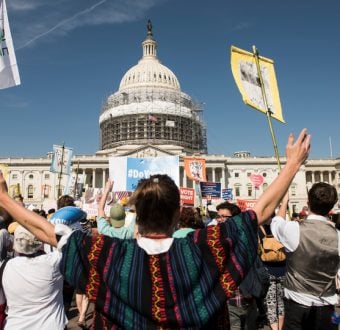North Carolinas ALEC-influenced government is passing some of the worst policies in the country. Last Saturday, concerned people and social justice groups from over 30 states gathered in Raleigh to demand government put the peoples interests over corporate welfare.
This rally was the latest action of the Moral Movement, a multi-issue cause that is pushing back against government corruption.
Here some of the worst attacks on North Carolinians:
- Healthcare: In an effort to assert independence from Obama, the Republican-led North Carolina legislature has refused to take federal funding to expand Medicaid. This means that 500,000 people in the state are without access to basic medical coverage. The move is particularly egregious considering environmental health hazards from the coal industry, which predispose North Carolina residents to pollution-related illnesses such as asthma.
- Unemployment: Governor McCrory hollowed out unemployment benefits, cutting state aid to 170,000 people during hard economic times, and severly limiting it to many more. McCrory boasted that this would send the unemployed back where they came from, implying that people had previously been flocking to the state for benefits. His legislature cut the maximum length of unemployment benefits from 99 weeks to just 19 weeks, and it reduced the weekly check from $535 to $350.
- Womens Healthcare: In July, the legislature snuck anti-access provisions into a motorcycle safety bill that shut down many women’s health clinics across the state.
- Voting Rights: North Carolina passed the most restrictive voter ID law in the country. It includes provisions such as cutting early voting and same-day registration. Restrictive voter ID requirements overwhelmingly prevent youth and seniors from turning out at the polls.
- Education: NC has cut funding for teacher salaries and schools. The state now ranks 48th in the country for average spending per student.
- Environmental Regulation:North Carolina’s regulators and legislators have enjoyed a cozy relationship with Duke Energy for years, accepting their campaign contributions and refusing to make the company clean up its coal ash dumps. If NC politicians had protected people instead of their corporate donors, the recent coal ash spill on the Dan River would never have happened.
Greenpeace Charlotte brought dozens of people to the march in Raleigh to support the interests of people over corporations, the right of North Carolinians to self-determination, and to advocate for access to clean air and clean water. Greenpeace Charlotte works to phase out coal and promote solar power in NC through its campaigns against the countrys biggest utility, Duke Energy.
Duke is not only pursing corporate profit at the expense of public health, it is actively promoting government corruption through its involvement in ALEC, the organization that is enabling North Carolina to formulate extremist policy. Greenpeace stands with the Moral Movement to promote justice and push back against the legislatures regressive agenda.



